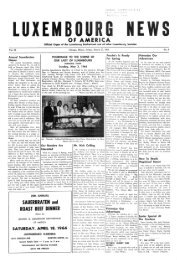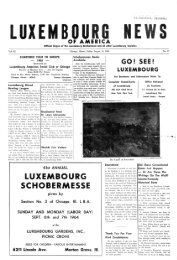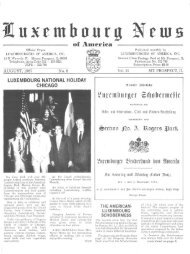$150.00 - Luxembourg American Heritage Information Center
$150.00 - Luxembourg American Heritage Information Center
$150.00 - Luxembourg American Heritage Information Center
You also want an ePaper? Increase the reach of your titles
YUMPU automatically turns print PDFs into web optimized ePapers that Google loves.
ing officer and Nick Conner from Dubuque was the secretary.<br />
The purpose of the convention was to establish an umbrella organization whose mission<br />
would be to preserve the ideals, characteristics and traits of the <strong>Luxembourg</strong> immigrants in<br />
America and, secondarily, to establish a benefit association open to all <strong>Luxembourg</strong>ers irrespective<br />
of geographic location. A tentative Constitution was adopted and further substantive<br />
proceedings were deferred until the Second Congress, which convened in St. Paul in 1894.<br />
A parade preceded the solemn church services. The meeting did not accomplish a great deal<br />
so it was decided to try again the following year. In 1895, a third Congress was convened in<br />
Dubuque. Delegates from the <strong>Luxembourg</strong> Independent Club of St. Paul, <strong>Luxembourg</strong><br />
Brotherhood of St. Paul, <strong>Luxembourg</strong> National Society of Minnesota, <strong>Luxembourg</strong> Benefit<br />
Society of Shakopee, <strong>Luxembourg</strong> Society of Winona, <strong>Luxembourg</strong> Nickolas Society of<br />
Rollingstone, <strong>Luxembourg</strong> Sick Benefit Society of Dubuque, <strong>Luxembourg</strong> Independent Club<br />
of Aurora, <strong>Luxembourg</strong> Independent Club of Chicago and the Bruderbund attended.<br />
As the tentative constitution had been scrapped in St. Paul, a new constitution was adopted<br />
and the name "<strong>Luxembourg</strong> Nationalverein" was given to the new organization.<br />
To meet death benefit payments, an assessment on the affiliated societies was proposed. Due<br />
to the lack of a favorable response to this proposal, the National Society came to a quick end.<br />
Attempts were made in 1896, and again in 1897, to revive the Nationalverein, but these efforts<br />
failed. In the ensuing ten year period, numerous efforts to revive the concept of an umbrella<br />
organization were initiated, but came to no avail, principally due to disagreements arising out of<br />
the proper role of religion and political affilliation.<br />
From 1888 to 1896, the Bruderbund prospered and grew rapidly. It now had 75 members<br />
including John N. Watry, who suggested that L.B.A. branch out and form new clubs in other<br />
<strong>Luxembourg</strong> settlements. Frank Dieschbourg is given credit for suggesting that the new<br />
branches be known as "sections."<br />
In Chicago, near the steel mills, a large number of <strong>Luxembourg</strong>ers settled. It became<br />
apparent that a local society could be established in the area. They had heard glowing reports<br />
of the Bruderbund and decided they would like to become part of the organization. A committee<br />
composed of John N. Watry, John Schmit, Nick Stirn and Frank Dieschbourg was appointed<br />
to draft an amendment to the constitution which would<br />
permit affiliation of "branches" into the Brotherhood.<br />
A meeting was called on the South side of Chicago and<br />
after deliberation, it was decided to organize another branch<br />
of the L.B. A., and that it would be designated as "Section<br />
2." It now became necessary to form a "head-organization,"<br />
and the first Grand Lodge meeting was held on February<br />
14, 1897. At this meeting, the organization of the Grand<br />
Lodge was established and the following members were<br />
elected as the first Grand Lodge officers:<br />
John Hankes<br />
1st Grand President<br />
Grand President<br />
Grand Vice President<br />
Grand Secretary<br />
Grand Treasurer<br />
Grand Trustee<br />
Grand Trustee<br />
Grand Trustee<br />
John Hankes<br />
Nick Mausen<br />
John N. Watry<br />
Nick Stirn<br />
John Diederich<br />
John Schmit<br />
Mathias Berchem<br />
In April, 1897, John Glesener, a member of Section 1,<br />
then living in Rogers Park, formed Section 3. On May 9, 1897, Section 3 was welcomed into the<br />
Bruderbund. In May, 1897, the 5th <strong>Luxembourg</strong> Congress was convened at Turner Hall on<br />
Chicago's north side. With the addition of Section 3, the newly invigorated L.B.A. extended an





